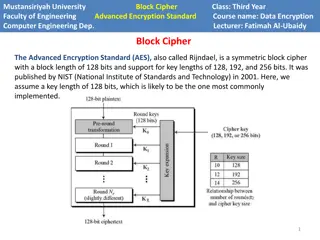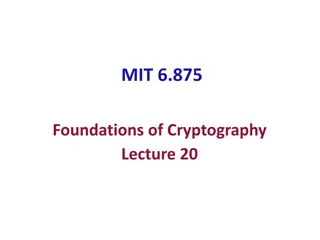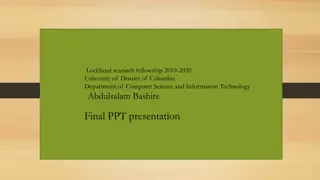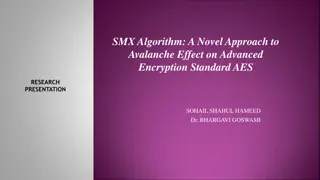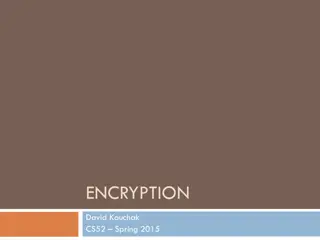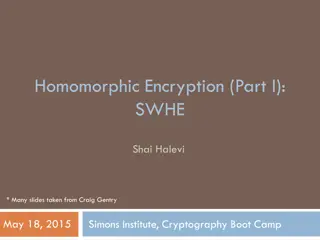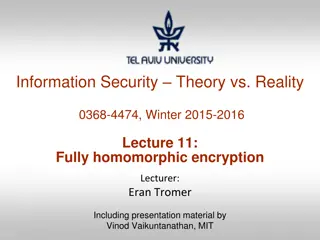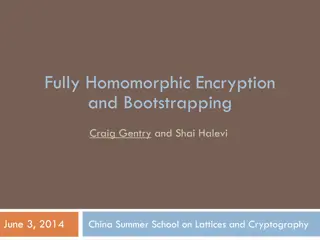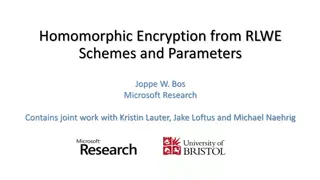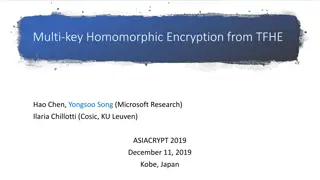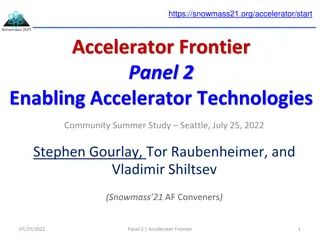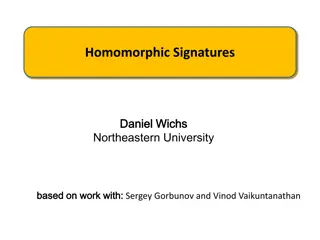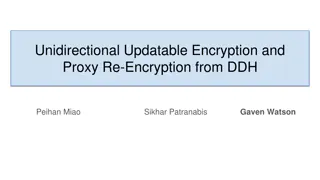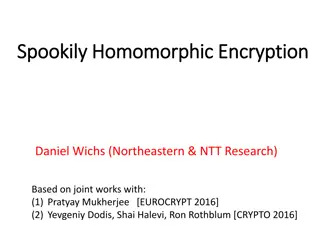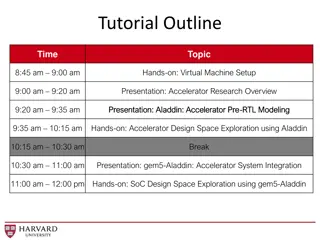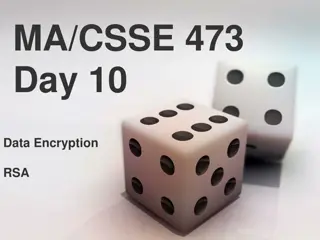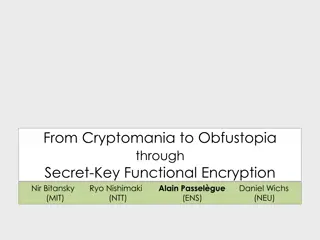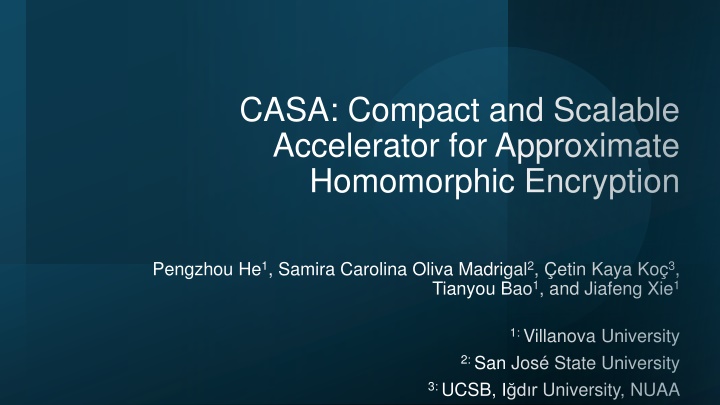
Compact and Scalable Accelerator for Homomorphic Encryption
Fully Homomorphic Encryption (FHE) is a crucial technology for data privacy, with CKKS being a prominent scheme for real-world applications. This paper introduces a novel methodology for CKKS hardware design, addressing existing drawbacks in hardware accelerators. The proposed architecture and pipeline strategy demonstrate superior performance on FPGA devices, focusing on efficiency, low-latency, and scalability.
Download Presentation

Please find below an Image/Link to download the presentation.
The content on the website is provided AS IS for your information and personal use only. It may not be sold, licensed, or shared on other websites without obtaining consent from the author. If you encounter any issues during the download, it is possible that the publisher has removed the file from their server.
You are allowed to download the files provided on this website for personal or commercial use, subject to the condition that they are used lawfully. All files are the property of their respective owners.
The content on the website is provided AS IS for your information and personal use only. It may not be sold, licensed, or shared on other websites without obtaining consent from the author.
E N D
Presentation Transcript
CASA: Compact and Scalable Accelerator for Approximate Homomorphic Encryption Pengzhou He1, Samira Carolina Oliva Madrigal2, etin Kaya Ko 3, Tianyou Bao1, and Jiafeng Xie1 1: Villanova University 2: San Jos State University 3: UCSB, I d r University, NUAA
Introduction Fully Homomorphic Encryption (FHE) represents one of the promising data-privacy technologies as it can execute various computational functions over encrypted data. HEAAN or equally referred to as CKKS is the first FHE scheme that supports real number homomorphic arithmetic operation. CKKS is arguably the most suitable one for real-world data-privacy applications due to its wider computation range than other HE scheme. Residue Number System variant CKKS scheme RNS-CKKS reduced the coefficients size from several hundreds of bits to a set of smaller coefficients within 64bits, at the cost of increased complexity in homomorphic operations and new constraints of parameter selections. Other types of FHE schemes such as FV, BGV, and BFV.
Introduction CKKS has been broadly implemented by software libraries across Windows, Linux, and Mac OS. However, the sheer amount of computational work makes it too expensive to use CKKS in today s deep-learning or even communication scenarios. Hardware Implementation: Application-Specific Integrated Circuit (ASIC) F1, CraterLake, BTS, and ARK FPGA HEAX, coxHE, and Medha
Challenges The existing hardware accelerators for CKKS involve three major drawbacks: Sophisticated structural design (which causes large resource usage) Limited flexibility in scalability (difficult to adjust the accelerator for different application scenarios, especially for resource-constrained applications) Lacking significant arithmetic innovation (key components are mostly implemented with existing algorithms/techniques)
Major contributions We present a new methodology for CKKS hardware design that emphasizes constructing fine-tuned micro- architecture and pertains to simplicity in each function module. We describe an efficient low-latency pipeline data flow constructed by operating the area-optimized microarchitecture modules for the bottleneck operation(key-switching) to facilitate the practical use value of CKKS (scalability). We investigate the fundamental arithmetic in homomorphic operations and propose a novel micro-architecture for CKKS using the proposed modular partially reduction-free strategy. The proposed architecture and pipeline strategy allow many special prime slots for switching the keys. We implemented and evaluated the proposed design on FPGA devices demonstrates the superior performance of the proposed accelerator compared to the existing hardware accelerators.
Primitive Function Modules The proposed Compact and Scalable Architecture for Approximate Homomorphic Encryption (CASA) is built on the 2018 HEAAN variant from Cheon et al. as it supports the core rounding operation that other approximate arithmetic HE schemes do not. The goal of CASA is that the accelerated CKKS can be practical for machine learning, artificial intelligence, and similar applications (especially in resource- constrained scenarios).
Partially Reduction Free Technique Explore RF-FIKO further by testing for generation of CKKS primes with RFT form. RFT: reduction-free trinomial. If the primes are not in the RFT form, then find primes for which we can have a partially reduction-free algorithm. If this item or the above item is successful, the algorithm can be integrated as a replacement for modular multiplication and reduction. Develop a low-latency parallel algorithm that requires no sequential data flow control, so that the point-wise multiplication and reduction can be finished in one cycle. Design a fine-tuned hardware micro-architecture for the parallel algorithm with minimum resource usage.
Fine-Tuned Hardware Micro- architecture
Fine-Tuned Hardware Micro- architecture
NTT Module
Dyadic and Accumulation (ACC) Module
Modulus Switching Bank Modular switching operation is a basis conversion operation that maps a ciphertext from modulus ??to a larger modulus ????, or in reverse.
Implementation Results We have coded our accelerator with VHDL (with functionality verified) and implemented by Vivado 2020.1 on the AMD-Xilinx ZCU-102 FPGA evaluation board. The implemented designs are categorized by different CKKS parameters and the design parameter ???.
There are several real-word applications where low- degree FHE, homomorphic evaluation, power efficiency, and low manufacturing costs are preferred. Intelligent traffic navigation, which requires the anonymity of vehicle users, while navigation needs to be real-time and energy efficient. Collaboration over a multi-party shared project or dataset where one or several participating parties possess only resource-constraint devices but must apply critical operations over encrypted messages. Application Discussion
In this paper, we present a compact and scalable accelerator suitable for the practical use of homomorphic technique. Several innovative techniques are applied to obtain a compact design target, including novel partially reduction-free modular arithmetic, modular switching bank multiplexing, and dataflow optimization. The proposed CASA is implemented on a resource- constrained FPGA resulting compact area usage and excellent timing, which is the first report in the literature. Compared with the state-of-the-art designs, CASA obtains significantly better overall performance (including the Artix-7 implemented CASA). Conclusion
While the proposed CASA is highly efficient in terms of compactness and scalability, more arithmetic innovations are expected to be carried out due to the huge computational complexity of CKKS (and other FHE schemes). Breakthroughs in the accelerator's design methodology need serious investigation as building such a large-scale accelerator is not a trivial effort. Future Work



